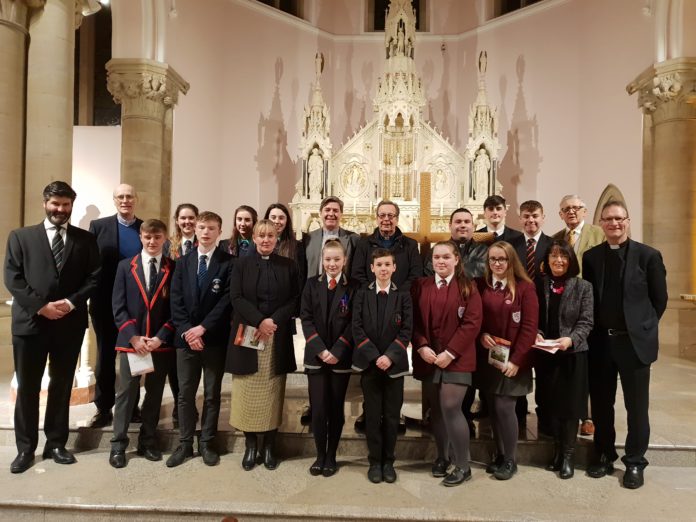

Dean Kenneth Hall, Fr. Kevin Malcolmson , Deacon Martin Donnelly. Also pictured are Paul Flynn Director of Music., Dr. Ronald Brown and Eileen Gallagher of Fermanagh Churches Forum.
ADDRESS BY MONSIGNOR JOSEPH McGUINNESS AT
SERVICE OF PRAYER FOR CHRISTIAN UNITY
St Michael’s Church, Enniskillen
Thursday 24 January 2019
Theme: “Justice, only Justice, you shall pursue” (Deuteronomy 16:20)
We can all agree that justice is a Good Thing. What we don’t always agree on is what Justice is. While we often appeal to justice, it is not always with the best of motives, and we may sometimes be in danger of distorting what its true meaning.
For some, justice may simply mean the Law, and may believe that justice can be achieved simply by legal means. But the fact is that laws and legal systems are as fallible as the human societies that create them. Human societies have enacted, and still do enact, unjust laws; laws that permit racial and social discrimination, laws that even allow for the killing of other human beings. And civil law has often nothing much to say about the rank injustices that often exist in human, social and international relationships.
We may think of justice as the righting of wrong, but the danger here is that justice may come to be seen simply as retribution, and easily degenerate into vengeance.
Or we may consider justice to be about equality, ignoring the danger that the pursuit of equality may drive towards a stifling uniformity and lose the richness of diversity.
For the Christian, justice possesses something of all of these views. Justice does involve a Law, but it is the simple, profound and infinitely challenging Law of love. Justice is about righting what is wrong, but always with compassion, even for the wrongdoer: “Love your enemies” says Jesus, “do good to those who hate you” (Matthew 5:44). And justice is about equality, the equality of human beings as created in infinite love by God, but each with his and her own rich uniqueness.
From a Christian perspective, justice is more than any of these things. For the Christian, Justice is grounded in the very nature of God himself.
From the moment that God created the world and came into relationship with humanity, that relationship was, and is, characterised by Justice. For the justice of God is nothing less than the love and the mercy of God. If, as St John says, “God is Love” (1 John 4:8), then we can also say that God is Justice, for justice is grounded in love (cf. Justin, Dialogue with Tryphon 93:3). Throughout the Bible we encounter again and again the justice of God as an instrument of mercy and salvation. We see it in the events of the Exodus, we hear it in the preaching of the Prophets, and we find it incarnated in the life, death and resurrection of the Lord Jesus.
For ourselves as Christians therefore, the true meaning of justice is to be found in contemplating the saving and merciful justice of God himself, especially as it is manifested in the person of Jesus Christ. In this way we are enabled in faith, through the graciousness of God, to grow in doing justice ourselves; and the cry for justice, the cry of the poor, the cry of the earth, finds a response in our hearts. If we understand and accept the saving justice of God and act accordingly, then we are in harmony with the world he has created and in right relationship with both humanity and the Lord himself. As the famous parable of the Sheep and the Goats puts it: “As you did it to one of the least of my brothers, you did it to me” (Matthew 25:40).
For Christian people, justice has to be more than striving for just laws, balancing rights or providing charity, good and important as all these things are. Justice is not weighing and balancing, as if it could be measured and parcelled out, for justice is a function of love and love can never be measured. And we have to be mindful too that the work of justice precedes the work of charity. Charity without justice is at best condescension and at worst an offence against human dignity.
If the saving justice of God is the model of how we do justice, then our commitment to social justice will arise from our recognition of humanity as a family created by God to live in unity. And this, of course, has profound implications for us as Christians, especially when disunity persists even among those who profess Jesus Christ as Lord.
How are we to envision this justice amid the challenges of the present time and the injustice that afflicts humanity? In his book A Theory of Justice, the American moral philosopher John Rawls argued for developing principles of justice based upon a thought experiment which he called the Original Position. His idea was that you should decide principles of social justice by first assuming position of blind ignorance. Assume that you don’t know anything about what position in society you would occupy, your social status or even your own talents or abilities. From behind this veil of ignorance, what principles of justice would you adopt? What kind of society would you want? Rawls’ idea, though intriguing, is somewhat self-centred. I prefer a simple story which is perhaps a Christian variation on a similar theme:
A monk, who in his earlier life had a great reputation as a teacher, left the monastery and retreated into the woods nearby to live as a hermit. He lived there for years, only having contact with the rest of the community when one of the younger monks was sent to bring him supplies. The monks respected his choice of a solitary and silent life but often felt the absence of his wisdom. One day the young monk who was delivering his supplies decided to be bold and broke the silence with a question: “All of us in the monastery would dearly love to know what knowledge and wisdom you have gained from all your years alone with God. If there is one message you would share with us, what would it be?” The old monk’s reply was very brief: “The Messiah is among you”, he said. The young monk didn’t dare question him any further and hurried back to the monastery, where he shared the old monk’s message with the rest of the community. For the monks, these were like the words of an oracle, and they began to think seriously about what they could mean. Could he really mean that one of them was the Messiah? If so, who? There was no way of knowing for sure, so from that day, each monk began to treat each of his brothers as if he were the Messiah. In time, the monastery became renowned as a place of great holiness and its community as one of perfect serenity, peace and justice.
The work of justice is indeed the fruit of love, oriented to the other rather than to ourselves.
When we do justice, may we do ourselves justice; when we do justice, may we do our faith justice; when we do justice, may we give glory to the God of justice. And may our common striving to make the saving justice of God present in the world assist us also on the path to that unity which the Lord desires.
“Great and wonderful are your deeds, O Lord God the Almighty! Just and true are your ways, O King of the ages!” (Revelation 15:3)

